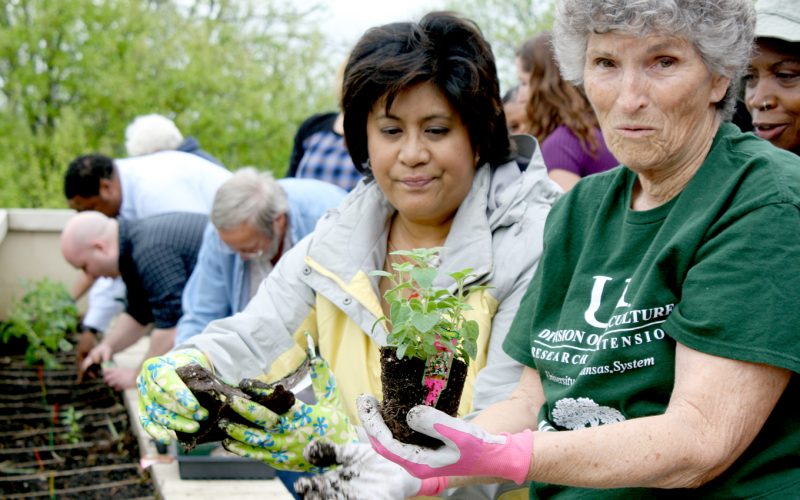
Staff Photo Nick Brothers | Joanne Murphy, director of public relations for Walmart, (left) and Pat Mills, master gardener (right), prep a herb to be planted in the flowerbed at the Fayetteville Senior Activity Center so the center can grow its own produce.
Project To Fight Senior Hunger In Arkansas
In an ongoing effort to end senior hunger in Arkansas, a food waste program implemented an on-site produce garden at the Fayetteville Senior Activity and Wellness Center Monday, April 18.
The garden is one of the phases of the What A Waste program to implement fresh vegetables, herbs and gardening activity for the seniors, as well as provide for composting of wasted food. Local master gardeners alongside representatives of Walmart and the Walmart Foundation planted some of the first vegetables in the garden.
“Beyond growing fresh produce, there are benefits of horticulture therapy,” said Heather Cosson, director of communication for the National Foundation to End Senior Hunger (NFESH). “When the seniors are outside and engaged in something they care about, studies show the benefits can be astronomical.”
Five months ago, the City of Fayetteville partnered with the National Foundation to End Senior Hunger (NFESH) to start the What A Waste program to better understand food waste at the Fayetteville senior center, made possible by a grant from the Walmart Foundation.

Staff Photo Nick Brothers | Representatives from Walmart and the Walmart Foundation plant a few of the first bits of produce and herbs into the flowerbeds with the seniors at the Fayetteville Senior Activity Center. The food program is funded by a grant from the Walmart Foundation.
Through What A Waste, all leftover food at the Senior Center is being separated, measured and catalogued. By learning which foods are left on the seniors’ plates, NFESH can determine which nutrients are being consumed and which nutrients are being wasted. This knowledge will enable the Senior Center to create menus and serve meals that can improve their clients overall nutrition and promote better health.
Through the program, NFESH found there were 159 pounds of prep waste in the kitchen, 298 pounds of food wasted in the serving pans, and 159 pounds of waste left uneaten on the plates of seniors, in total 862 pounds. Most of the plate waste was vegetables. The waste is composted, and that soil was used to start the garden.
Seniors are defined as people older than 60. Nationally, 15.5 percent of seniors face food insecurity and Arkansas was the highest on that list at 24.8 percent, or 1 in 4, according to data from a 2014 Census study by the National Foundation to End Senior Hunger.
About 40 percent of food is wasted or uneaten in the U.S., according to research by the Natural Resources Defense Council.
The study brought a few factors to light about what seniors eat, too. As it turns out, many seniors prefer not to eat canned pears and iceberg lettuce because how the grainy foods can get caught in dentures and cause discomfort.
“We are really excited to have a vegetable garden for the seniors,” said Cayla Wilson, Director of the Fayetteville Senior Activity and Wellness Center. “We’re hoping other senior centers will follow in our pattern for growing food produce. Fresh produce is so expensive, we give out farmer’s market coupons, and $50 doesn’t go very far at the farmer’s market.”

Staff Photo Nick Brothers | Pat Mills, master gardener, plants a few herbs into the flowerbeds at the Fayetteville Senior Activity Center to help begin a new phase in a food program that seeks to end senior hunger in Fayetteville.
The Senior Center was chosen as one of the sites to participate in the City of Fayetteville’s pilot project to compost food waste. Each week, the separated food waste from the Senior Center is picked up by the City to be composted.
“The City of Fayetteville is actively searching for ways to reduce our dependency on landfills and composting holds a lot of promise is accomplishing that goal,” said Brian Pugh, Waste Reduction Coordinator for the City of Fayetteville. “With partnerships like what the City has with the Senior Center, we can make great strides in reaching that goal and at the same time use quality compost to grow food for programs that help our residents.”
The new garden will use the composted soil provided by the City. The Department of Horticulture at the University of Arkansas is donating tomato plants and other seedlings to be planted in the garden. They have also offered to share their expertise and help the seniors maintain the garden throughout the growing season.
“The University of Arkansas Department of Horticulture is pleased to participate in this project to reduce senior hunger,” said Heather Friedrich, Program Specialist for the University of Arkansas Department of Horticulture. “Community gardens are a great way to provide food to those who need it while building relationships across generations and cultures.”










